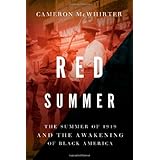
Average Reviews:

(More customer reviews)Are you looking to buy Red Summer: The Summer of 1919 and the Awakening of Black America? Here is the right place to find the great deals. we can offer discounts of up to 90% on Red Summer: The Summer of 1919 and the Awakening of Black America. Check out the link below:
>> Click Here to See Compare Prices and Get the Best Offers
Red Summer: The Summer of 1919 and the Awakening of Black America ReviewWe have had the occasional flare-up of mass racial violence in the past few decades. We have had nothing like the summer of 1919, when there were riots and lynchings in many large American cities, and countless episodes of violence in smaller ones. They changed race relations and changed America forever, but perhaps because 1919 is now so far away, few recognize it as a time monumental in the history of American civil rights. Thus there are plenty of eye-opening revelations in _Red Summer: The Summer of 1919 and the Awakening of Black America_ (Henry Holt) by Cameron McWhirter, the first narrative history of that epochal year. McWhirter is a reporter for _The Wall Street Journal_, and much of the obviously extensive research he has done involves the way the newspapers covered the violence at the time. Not only does he give narratives of the causes and details of the riots in Chicago, Washington, Omaha, and other cities, he gives a broader picture of the reasons 1919 should have been a particular year for racial violence, and the changes the violence wrought.Many Americans, and much of the world, were looking for 1919 to be a year of spreading peace and good will. Thousands of black soldiers returned from The Great War with higher expectations, and their families and communities shared the optimism that there would be change. White society was, to put it lightly, not ready for change, and was fearful that change might come. There was an upsurge in lynching, with NAACP files showing 52 black people being lynched during the year, and not just in the South. Much of McWhirter's book is distressing reading, describing the specific actions within the riots, and the torturing and lynching, and the government officials who were incapable or unwilling to put a stop to the rioting by whites. In all cases, the racial riots were started by whites massing against blacks (although there may have been some action by individual blacks that triggered the response). Typical of the reporting on the riots in Elaine, Arkansas, were leads delivered by whites in charge; a headline about the riots in _The Washington Post_ read in part, "Big Uprising Was Plotted," and in the _Los Angeles Times_, "Negroes Plot White Massacre." McWhirter says, "The narrative meshed with nationwide white fears of racial violence and radicalism: stored ammunition, passwords, `Paul Reveres' riding into the night, and a white socialist lawyer as a mastermind." The picture was completely false; there had been no black insurrection, only some black farmers organizing to make sure they were not bilked when selling their crops. The riot in Elaine, like many others described here, was simply a massacre of blacks; there was no forensic accounting afterwards, and probably a few hundred were killed, but no one knows even an approximate number. The lack of action by President Woodrow Wilson is a theme here. It is true that he was far more interested in working for his plan (eventually a failure) to have America enter a League of Nations, but he did nothing toward eliminating racial violence or even in prosecuting those who took part in lynch mobs. When asked for statements from black leaders, he had nothing to say. Congress followed Wilson's lead, saying little; legislation that was simply against lynching was introduced and could not get passed.
What did change was that blacks began to realize they did not have to take the abuse of rioters silently any more. As the summer of 1919 progressed, blacks were arming themselves; the resulting violence may have disgusted whites and blacks, but large-scale white violence was being met by large-scale black violence. This is one of the reasons that there were fewer such riots in subsequent years. Also blacks felt more reason to attempt to take control; there was more political action and registering to vote. Tens of thousands joined the NAACP, which because of the year's events, became the most powerful civil rights group for its time. Many of the whites who rioted during that year never came to justice, but also some of the blacks who had been arrested and even put on death row had their trials reviewed and the obvious unfairness reversed. Of course there was going to be more violence in the upcoming decades, but the brutality of 1919 was never repeated, and it inspired black Americans to strive for true equality. McWhirter writes, "Even a skeptic must conclude that American history, with all its violence and contingency, has progressed in extraordinary ways regarding race relations." That the Red Summer was a fundamental starter of that progress is the book's surprising and inescapable conclusion.
Red Summer: The Summer of 1919 and the Awakening of Black America OverviewA narrative history of America's deadliest episode of race riots and lynchingsAfter World War I, black Americans fervently hoped for a new epoch of peace, prosperity, and equality. Black soldiers believed their participation in the fight to make the world safe for democracy finally earned them rights they had been promised since the close of the Civil War.Instead, an unprecedented wave of anti-black riots and lynchings swept the country for eight months. From April to November of 1919, the racial unrest rolled across the South into the North and the Midwest, even to the nation's capital. Millions of lives were disrupted, and hundreds of lives were lost. Blacks responded by fighting back with an intensity and determination never seen before. Red Summer is the first narrative history written about this epic encounter. Focusing on the worst riots and lynchings—including those in Chicago, Washington, D.C., Charleston, Omaha and Knoxville—Cameron McWhirter chronicles the mayhem, while also exploring the first stirrings of a civil rights movement that would transform American society forty years later.
Want to learn more information about Red Summer: The Summer of 1919 and the Awakening of Black America?
>> Click Here to See All Customer Reviews & Ratings Now



